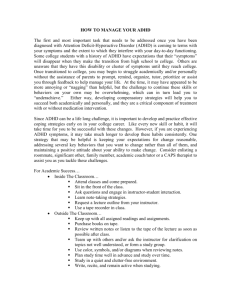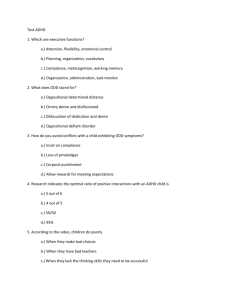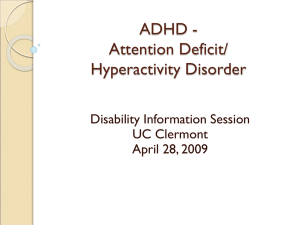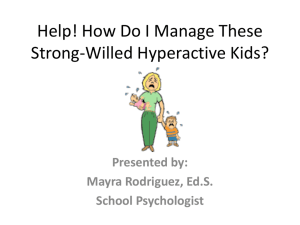Inquiry Project
advertisement
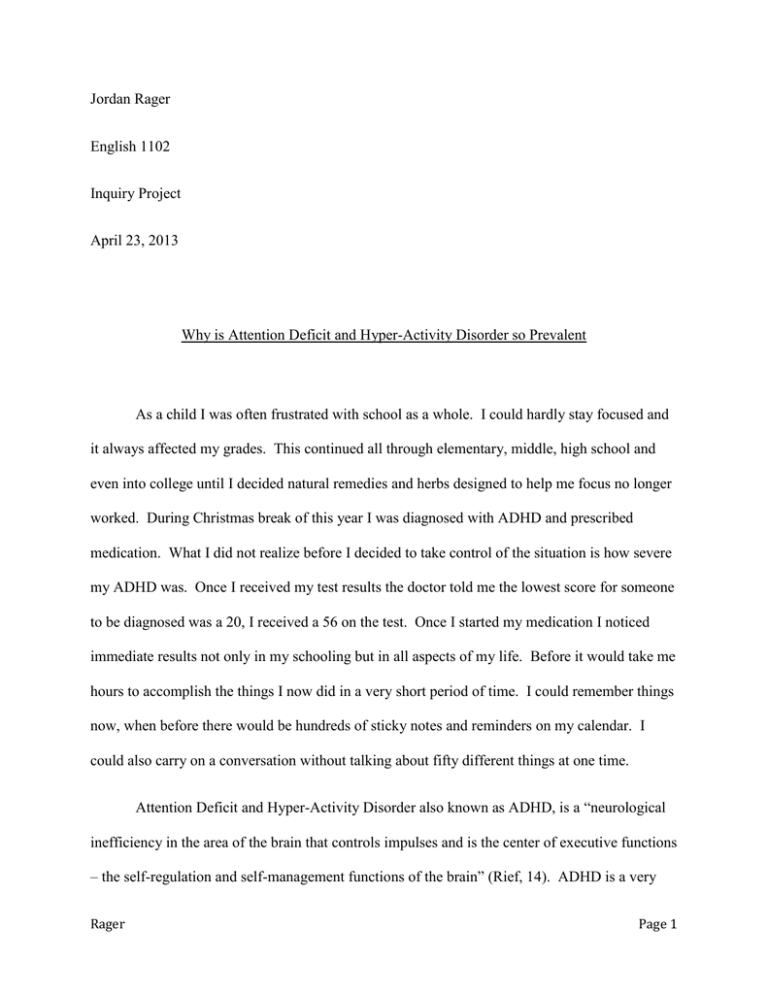
Jordan Rager English 1102 Inquiry Project April 23, 2013 Why is Attention Deficit and Hyper-Activity Disorder so Prevalent As a child I was often frustrated with school as a whole. I could hardly stay focused and it always affected my grades. This continued all through elementary, middle, high school and even into college until I decided natural remedies and herbs designed to help me focus no longer worked. During Christmas break of this year I was diagnosed with ADHD and prescribed medication. What I did not realize before I decided to take control of the situation is how severe my ADHD was. Once I received my test results the doctor told me the lowest score for someone to be diagnosed was a 20, I received a 56 on the test. Once I started my medication I noticed immediate results not only in my schooling but in all aspects of my life. Before it would take me hours to accomplish the things I now did in a very short period of time. I could remember things now, when before there would be hundreds of sticky notes and reminders on my calendar. I could also carry on a conversation without talking about fifty different things at one time. Attention Deficit and Hyper-Activity Disorder also known as ADHD, is a “neurological inefficiency in the area of the brain that controls impulses and is the center of executive functions – the self-regulation and self-management functions of the brain” (Rief, 14). ADHD is a very Rager Page 1 complicated disorder because it has multiple underlying factors that can have an effect on how it is expressed. Things like gender, coexisting conditions, look a-likes, possible causes of ADHD, making the diagnosis, and all the different medications offered for this disorder, make sifting through all of the information offered about the disorder very difficult. So for my inquiry project I will do an exploratory paper on why ADHD is so prevalent in our society today. I plan to cover everything from what the possible causes of the disorder are, to is there a cure for ADHD in hopes of coming up with my own answer as to why ADHD is so prevalent. A specific definition for ADHD is difficult to come by because many people make up their own definition because they do not understand what the disorder is. It is a biological disorder which means it is a disorder involving the brain. “Medical scientists think that ADHD is caused by a chemical problem in the brain” (Beal, 9). Just like depression, or Alzheimer’s the disorder cannot be prevented or cured because it involves the brain. The severity of the disorder varies from person to person and from case to case. The way it is expressed is different for every person as well. For example, boys express the disorder in more hyperactive and impulsive ways, as girls tend to become introverted and timid. The word “become” is confusing for most people because ADHD is often viewed as something you are born with. Which in many cases may be true, but you wouldn’t notice the signs of ADHD in a very small child. Most of the time a child will show signs of ADHD before the age of seven. This is another issue for diagnosis because many parents cannot distinguish between abnormal and typical “kid behavior.” In my case I did not really decide I had all of the signs until college. ADHD can also develop if all of the factors that play a role in the causes of the disorder are aligned just right. “Rates for ADHD diagnosis increased an average of 3% per Rager Page 2 year from 1997 to 2006 and an average of 5.5% per year from 2003 to 2007.” (“AttentionDeficit/Hyperactivity Disorder”) As stated before Gender plays a big role in how the disorder is expressed as well. “Boys (13.2%) are more likely than Girls (5.6%) to be diagnosed with ADHD” (“AttentionDeficit/Hyperactivity Disorder”). Many girls have problems with misdiagnosis or underdiagnoses because they express ADHD by becoming very shy or timid and often times struggle with learning difficulties, social problems, and low self-esteem. They then have the tendencies to take these frustrations out at home that were hidden at school or social gatherings. Lastly girls with ADHD often experience more peer rejection than boys with ADHD. Boys with ADHD express the disorder in a very different way, and they are more likely to be diagnosed. Boys often exhibit more hyperactivity and impulsivity in their symptoms and this is often exhibited by not being able to sit or being constantly on the move. In the classroom they may blurt out the answers, become aggressive with others, or interrupt others. They also do not think how others might feel, this goes alongside with impulsivity. All these symptoms are exhibited more in boys with ADHD and are obvious signs of the disorder, which is why boys are more easily diagnosed. Being diagnosed with ADHD is not supposed to be an easy task, although many doctors make it very easy. To be properly diagnosed you are to have blood work done to make sure there are no underlying health issues, take a test with multiple questions evaluating the severity of your symptoms, and sometimes even visiting a psychiatrists is necessary for diagnosis. All of these steps are not always taken which is why medication for ADHD has become a negative thing instead of a positive. Some doctors listen to the patient’s complaints and determine, Rager Page 3 without doing any of the following steps, that the patient has ADHD. Usually being diagnosed involves receiving medication, and this is why most of America is over-prescribed and overdiagnosed with ADHD. With it being this easy for anyone with a focus problem to get their hands on the medication, the selling of ADHD and ADD medications is becoming a very prevalent problem on college campuses. There is talk about if this should be considered a form of cheating and what can be done to solve this issue. One way to solve this problem would be to regulate the diagnosis for ADHD and ADD patients. If there were harsher laws and tests done to be diagnosed, then the problem would become less of a worry for college campuses. Also monitoring students even more during exam times would help the problem since this is the time that most students decide to use the medication. On the other end of the spectrum there is talk around whether or not people diagnosed with ADHD need to be medicated. Often times it is said that ADHD is an excuse for everything from bad parenting to being a bully. I can only speak from personal experience when I say that my being diagnosed had nothing to do with these excuses and everything to do with a disorder. I believe that being prescribed medication was a positive thing, at least in my situation. Although this may not be necessary for everyone, just like in my case, the patient may see more positive effects in their everyday life. Just like any other neurological disorder ADHD sometimes requires medication. Just like in Alzheimer’s patients the medication used in ADHD helps with the symptoms but does not cure. Although the cause of ADHD is not yet known there are many speculations around the possibility that our everyday life could play a role in the cause of the disorder. Genes are said to Rager Page 4 play a big role in possible causes for the disorder. “ADHD has a strong genetic component, so strong that diagnosed have a 1 in 5 chance to pass it on to their children” (“Living with ADHD”). Environmental factors also play a role in the development of ADHD. For example “Certain substances pregnant mothers consume or expose the developing fetus to are believed to increase risk factors and may be a contributing cause for ADHD in some children” (Rief, 27). Also people who are exposed to high levels of lead, which can be found in things like plumbing or paint, may have higher risk of developing ADHD. Although there is not much to be done to prevent these factors, learning about these specific genes will lead to better treatments. Also avoiding the things that are within our control will help to prevent future diagnosis. So why is ADHD so prevalent? In my opinion it is because so many more people are being misdiagnosed than ever before. In the ever changing and ever growing society it is hard to focus on a normal level, much less if you are the unfortunate one with a neurological disorder. The “prescribe, prescribe, prescribe” type of society we live in today does not help with the patients who do not necessarily need medications. With that being said I do believe to some extent or in some cases ADHD does not need to be medicated, but in others, like my own I do not think there should be a question surrounding medication. Maybe a solution could be that the number for the ADHD screen test (mine being 56) should move from a required 20 to a 30 to be able to qualify for medication. If the number were higher then that would cut out a huge percentage of people who might not necessarily need to be medicated. This would also solve the issue of doctors “giving out” prescriptions to low scoring patients. Another idea would be require proof of blood tests and written tests for patients. Like I stated before doctors just hand out this prescription without thinking of the possible repercussions. On the other hand many patients go into the doctor’s office having talked to Rager Page 5 ADHD patients and already know the questions on the test, or they already know to estimate high on all the questions to bump up your overall total. If there was a law that required documentation and proof that blood tests and written tests were administered, and all the data was recorded and reviewed, then there would be a little less wiggle room around if you do or do not actually have the disorder. These are just a few ideas, but I believe medication truly has a huge impact on why ADHD is so prevalent. Many people do not actually know the effect ADHD medication can have on someone who is not affected by the disorder. It is seen mainly in college settings used by college students to pull an all-nighter, or used right before taking an exam to focus more. For someone with ADHD it has the exact opposite effect; the medicine does not speed you up or help you to stay awake, it actually slows them down and brings them down to everyone else’s level. This is why everyone is trying to get their hands on ADHD medications. Just like the drug Speed, it helps you to stay awake, gives you energy, and gives you “tunnel vision” in a sense. Who wouldn’t want to have that during exam week? Although it does provide many beneficial elements to people who are not affected with the disorder it obviously is not recommended; Possessing, using, or selling of ADHD medication is a Felony in most states. I personally have seen people walking through Atkins selling Adderall (an ADHD medication) for twenty five dollars a pill. So not only is it beneficial to test takers, but it is financially beneficial to the people selling it instead of taking it themselves. Attention Deficit and Hyper-Activity disorder should not be a scary thing; it should not be abused for privileges and benefits, or used as a money maker. It should be exactly what it is; a neurological disorder in which the patient and doctor as partners should decide the best route Rager Page 6 for the patient. But this simply is not the case because of all the “hype” surrounding ADHD not only as a disorder but for the medication used for it. Works Cited Rager Page 7 “Attention-Deficit/Hyperactivity Disorder.” Center for Disease Control and Prevention.11 December 2011. Web. 29 April 2013. Beal, Eileen. Everything You Need to Know About ADD/ADHD. Page 9. New York: Rosen Pub. Group, 1998. Internet Resource. “Living With ADHD.” Youtube. BBC Documentary. 20 January 2013. Web. 1 April 2013. O’Rouke, Frank. The ADD/ADHD Checklist: A Particular Reference for Parents and Teachers. Segundo. New York: New American Library, 1982. Print: Page 14. Page 27. Rager Page 8

